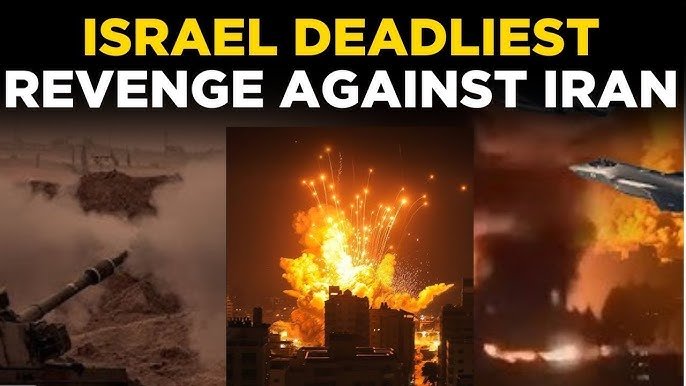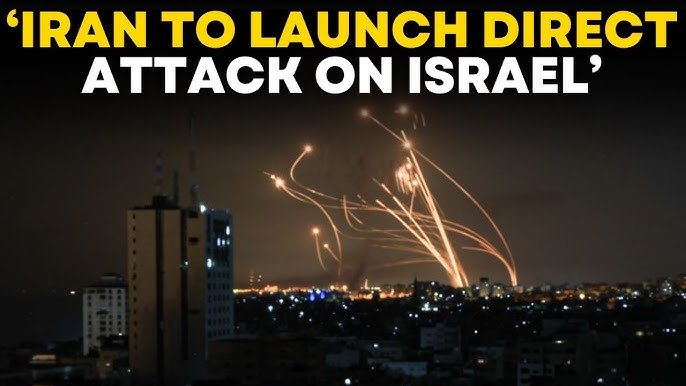In a dramatic escalation, Israel has launched a powerful and highly coordinated offensive against Iran, striking what officials describe as multiple nuclear and military targets across the Islamic Republic. The strikes, which rocked cities like Tehran in the early hours of June 13, 2025, have sent shockwaves through global markets, international diplomacy, and security circles.
The world is watching closely, as fears of a full-blown war between Israel and Iran mount rapidly. Lets break down the developments, reactions, and what this could mean for the future.
Israel Confirms Major Pre-Emptive Strike
Early Friday, Israel confirmed it had launched pre-emptive airstrikes on Iranian soil. The military claimed to have targeted “dozens” of nuclear and military sites, including uranium enrichment facilities and missile development hubs.
According to Israeli intelligence, Iran was just days away from having enough enriched material to produce up to 15 nuclear bombs. The timing of this strike comes as the U.S. and Iran were preparing for renewed talks.
Explosions Across Tehran: A City on Alert
Multiple explosions were reported across Tehran, with Iranian state media confirming that air defense systems were activated in response. Footage shared on social platforms captured panic-stricken residents, flashing skies, and sirens wailing through the night.
Irans authorities confirmed significant damage to several buildings, including an apartment complex, while hospitals began receiving casualties.
Netanyahu Declares: ‘Opening Salvos of a Long Campaign’
Israeli Prime Minister Benjamin Netanyahu called the strikes “very successful” and warned that this was just the beginning.
We carried out a very successful opening strike, and with Gods help, we will achieve much more, Netanyahu said in a nationally broadcast video. He reaffirmed that operations against Iran will continue for “many days.”
Iran Vows Retaliation: We Will Defend Our Nation
Irans foreign ministry issued a bold warning, saying the country had the legal and legitimate right to respond under Article 51 of the UN Charter.
Irans armed forces, according to their statement, “will not hesitate to defend the Iranian nation with all their might.” Supreme Leader Ayatollah Ali Khamenei declared that Israel has unleashed its wicked and bloody hand.
Senior Officials and Scientists Killed in Strikes
Iranian state TV has confirmed the deaths of high-ranking officials, including Major General Gholam Ali Rashid. Top nuclear scientists Mohammad Mehdi Tehranchi and Fereydoun Abbasi were also reported killed. These assassinations are a major blow to Irans military and nuclear leadership.
There are also unconfirmed reports suggesting the possible death of Iran’s Revolutionary Guards Chief, Hossein Salami.
Israel Notifies U.S. But Acts Independently
Though Israel notified Washington before the attack, the Biden administration (and particularly President Trump) confirmed that the U.S. was not involved.
Two American officials told the media the strike was purely an Israeli operation. Despite this, Israeli officials maintain a “dialogue” with the U.S., but insist the decision to strike was entirely their own.
UN Nuclear Watchdog Monitoring Closely
The IAEA (International Atomic Energy Agency) confirmed that Israel targeted Irans Natanz nuclear site, a key facility in Irans uranium enrichment program.
Rafael Grossi, the head of the IAEA, said the agency is monitoring radiation levels and is in contact with Iranian authorities and their own inspectors stationed in the region.
Air India and Other Airlines Divert Flights Amid Chaos
With Iranian airspace now considered hostile, several Air India flights have been diverted or returned mid-air. Flights from New York, London, Toronto, and more are being rerouted to Vienna, Jeddah, Sharjah, and Frankfurt.
Countries like Iraq have also shut down their airspace, suspending all incoming and outgoing flights to avoid any collateral damage from escalating military operations.
Trump: Iran Cannot Have a Nuclear Bomb
Speaking to Fox News, U.S. President Donald Trump reaffirmed his administration’s position: Iran cannot have a nuclear bomb, and we are hoping to get back to the negotiating table.
While expressing hope for diplomacy, Trump emphasized the seriousness of the threat posed by Irans nuclear ambitions.
Rubio Warns Iran Against Targeting U.S. Forces
U.S. Secretary of State Marco Rubio made it crystal clear: We are not involved in strikes against Iran. Iran should not target U.S. interests or personnel.
This warning comes amid fears that Tehran might retaliate not only against Israel, but also against American bases across the Middle East.
Sixth Round of Nuclear Talks Now in Jeopardy
Just days before the airstrikes, Iran and the U.S. had agreed to resume nuclear negotiations in Oman on June 15. With Tehran under attack, the fate of those talks now hangs by a thread.
Diplomats fear that Irans participation in the talks may be canceled entirely, further inflaming regional tensions.
Whats Next? Potential Iranian Retaliation
Israels army chief, Lieutenant General Eyal Zamir, cautioned the public: I cant promise absolute success the Iranian regime will attempt to attack us in response.
Analysts warn that a possible Iranian counterstrike using drones, missiles, or cyber weapons is imminent. Citizens in Israel have been instructed to prepare for emergency measures.
Conclusion
The situation between Israel and Iran is more volatile than ever. With nuclear scientists killed, nuclear facilities bombed, and both nations vowing to escalate, the world faces the threat of a new warfront in the Middle East.
Global leaders are now pushing for urgent de-escalation, but with both countries standing their ground, peace seems far off.
Final Thoughts
The bold strikes by Israel have undeniably shifted the geopolitical balance in the Middle East. Whether this prevents a nuclear Iran or opens the gates of regional warfare remains to be seen.
One things clear the entire world is holding its breath, watching what unfolds between Israel and Iran.










